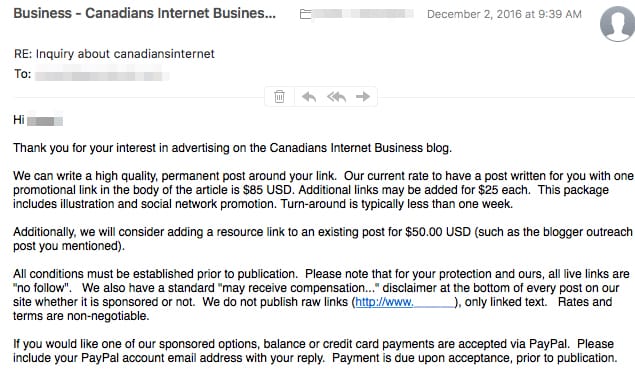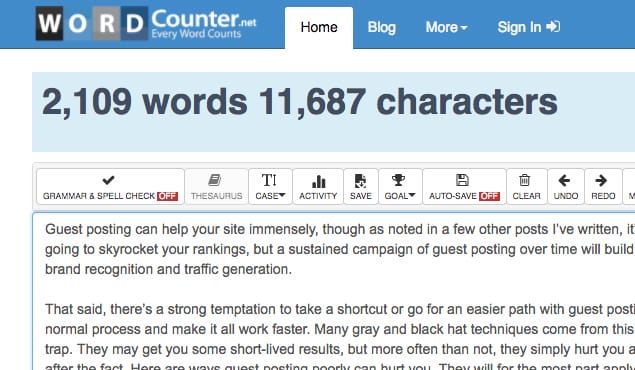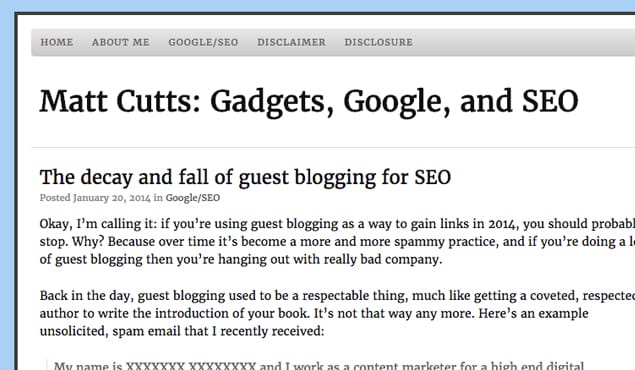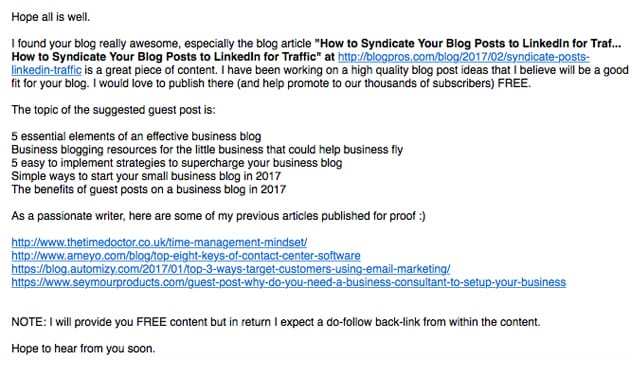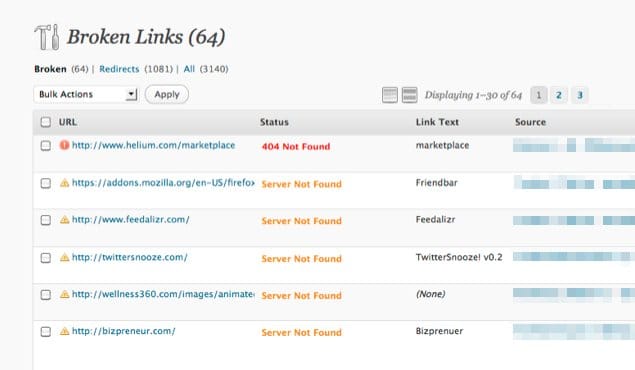Guest posting can help your site immensely, though as noted in a few other posts I’ve written, it’s a slow burn. No one guest post is going to skyrocket your rankings, but a sustained campaign of guest posting over time will build and compound into an engine of brand recognition and traffic generation.
That said, there’s a strong temptation to take a shortcut or go for an easier path with guest posting, in an attempt to subvert the normal process and make it all work faster. Many gray and black hat techniques come from this desire, and they are almost always a trap. They may get you some short-lived results, but more often than not, they simply hurt you and are a pain to clean up, months after the fact. Here are ways guest posting poorly can hurt you. They will for the most part apply to both the publisher of the guest post and the guest author themselves.
1. Obviously Paying for Links
Google strives to provide the best possible content for a given query, and they have built up an immense and complicated algorithm to identify what content is better for a topic than other content. Links are often foundational to this algorithm, with many modifiers to their value and much analysis into their aspects.
In an effort to keep everything as fair as possible, Google wants to eliminate the advantage money brings to the table. They don’t want big brands to overrule small bloggers simply because they have more money. This happens to a certain extent anyway, but it’s easy to shoot yourself in the foot with paid links. Google is extremely well practiced in identifying when a link has been paid for, and they can make it very unfortunate for both the publisher and the buyer.
In general, you should avoid paying or accepting money for guest posts. If money – or a product gift of some kind – is involved, the post should be clearly labeled as a sponsored post and all links should be nofollowed.
2. Publishing Short, Thin Content
It should come as no surprise that Google doesn’t like short and thin content. Anything under 500 words is really pushing it and has to be extremely valuable if you want it to mean anything. Generally, I would consider 1,000 words to be the absolute minimum you should either write or publish, and I try to shoot for at least 1,500-2,000 for blog posts on both my site and others. The exception is on sites like VentureBeat or Inc, where the average word count on a post is much shorter, and the site specifically requests shorter content as part of their editorial guidelines.
The key to writing shorter posts is to eliminate as much fluff as possible. Every sentence needs to mean something and have some value. These sites aim for either newsworthy content or actionable intelligence, so tailor your short posts to providing as much as possible in relatively little space. You can’t write surface-level, basic content here, you need high quality in every line.
3. Publishing Poorly Written Content
Poorly written content hurts anyone involved with its publication, both the people who host the content and the person whose name is attached to it. Think about it like a builder or an architect. If they build a building and that building has numerous issues and falls apart in a year, they’re going to have that on their reputation. Other people won’t hire that builder, because the work they produce is shoddy crap.
The same goes for your reputation online. If people see your name all over the internet, on various blogs, writing content that’s boring or is full of typos, they’ll wonder how well you could possibly run a business. There’s some extra leeway if you’re not a native English speaker, but even then, excessive errors or poor quality content will reflect poorly on you.
4. Publishing Irrelevant Content
One of the core tenets of guest posting is that the content you produce – or publish – should be relevant to the audience reading it. For example, this blog right here is focused on guest posting. I would accept guest posts about guest posting, or about marketing, or about blogging, because you’re likely to want to read about those subjects. I might have a little hesitation publishing posts about PPC or about cold calling, since those are a bit outside scope. I would definitely not accept a post about the best new sinks of 2017 or where to find a good burger in Connecticut. Maybe a couple of you would like to know about that, but it’s outside the scope of my blog.
The same goes for when I’m writing a guest post. I focus on targeting sites that have something to do with my area of expertise, and I try to write content that is relevant to the audience that will be reading the post.
5. Publishing Stolen Content
This one should be obvious as a general no-no for marketers. Just don’t do it.
Stealing content in any way is going to be an instant red flag for your site or for your brand name, if your name is attached to it at all. If you’re accepting guest posts, always run them through a plagiarism checker, preferably one sophisticated enough to recognize poorly-spun content. If you’re submitting guest posts to be published on other sites, make sure the content is original and unique to you. Otherwise at best the post will be rejected and you are likely to be blacklisted by that person and anyone they know. At worst it will be published and Google will slam a penalty on your site for stealing content.
6. Publishing the Same Content Numerous Places
Syndication is already a tricky technique to master when it comes to online marketing. If it’s not done properly, it can result in duplicate content penalties, or at least a loss of trust that can exacerbate future problems with content. Syndication really needs to be done correctly and carefully for it to have any value.
Guest post spammers often simply create one post and submit it to dozens of sites, hoping they will pick it up and not check to see if it has been published elsewhere. Sometimes they spin it too. Both will result in duplicate content issues and it can all go back to the site sending out the offers. No one wins in that scenario.
7. Spamming Guest Post Demands to Everyone
Related to a couple of the above points is the idea of spamming out your guest post pitches to everyone. Any blogger with any exposure can tell you that they get these pitches in their inboxes all the time. They’re often generic, with no hint of what the content actually would be, and they go to everyone regardless of niche. “I will write a piece of compelling content for your site related to your content, all you have to do is provide me with a link.”
This is not a good pitch. Every good guest post pitch needs to include some specific ideas as to what the content might include, something that shows you did research into the blog you’re pitching and have read their submission guidelines, if they have any.
8. Driving Fake Links to a Guest Post
One element people often miss with guest posting is that you’re supposed to help support the posts you get published. When someone publishes a guest post I wrote, I retweet it, I link to it, and I share it. I expect that anyone whose post I accept does the same for my publication. When people do, it helps grow both of our audiences. When they don’t, it shows they don’t care about anything more than the link, and it barely benefits either party.
Going too far in the other direction can be detrimental as well, however. If I publish a guest post and the person who submitted it buys a hundred fake backlinks, I’m going to be pissed. It’s basically a negative SEO attack at that point, and while a lot of the negative value passes on to the guest poster, it can still hurt my site. I have to waste time removing those links and disavowing them, and that’s a hassle no one should have to deal with. They may even delete the post.
9. Keyword Stuffing Content
Relating again to the quality of the content in the guest post, be very careful about keyword over-optimization. Google will be happy to slap down the SEO value of the post if it includes keyword overuse, and while there’s no magical formula for how often a given keyword should be used, just remember that it should sound natural. Keywords are just words that guide the topic of the post; if they stand out as unnatural, edit the post.
10. Overusing the Same Anchor Text
Anchor text is tricky, and it’s mostly on you as the person who submits guest posts, not as the publisher. Anchor text needs to have natural variation to it. If you use the same keyword as the anchor for every link that comes in, you build up an unnatural link profile.
You can read all about it here, even though the post is old, the information in it still stands. You want some variation, but not so much variation that there is never repetition; it needs to look natural. I like to use a mixture of generic “click here” words, titles of posts, phrases like “this post from X” and keywords.
11. Linking to Malicious Pages
Malicious code is a great way to get your site blocked by Google, if you’re the site hosting it. If you’re the one linking to it, it can hurt your site and even potentially get that specific page deindexed until you fix the problem. It’s one of many ways Google will hurt you for linking to another site.
Always check the destination of any link in a post you publish. Decide if it’s valuable enough to leave followed, if it’s not good enough and should be nofollowed, or if it’s simply spam and should be removed entirely. If the page tries to execute a script, download a file, or otherwise tamper with your system, at the very least you should remove the link. If it’s the link the poster wants promoted, I would probably just reject the post entirely and maybe even blacklist the person involved. It’s not like you’re going to run out of potential guest post authors.
12. Linking to Broken Pages
Broken links have many of the same issues as the above, though they won’t hurt you as hard. It’s something you should verify with the guest poster, if they have the correct link. I wouldn’t immediately jump to blacklisting or rejecting the post, but rather ask for clarification.
Sometimes it’s a good link that was simply cut off in the transition from their word processor to yours. If they insist that the link is correct but it always resolves a broken site or 404 page, well, then you can decide to either remove it or reject the post.
13. Linking to Spam Pages
This one is a bit harder, but it’s also the primary focus of your link filter as a publisher. Obviously, if you’re the one running a spam page and sending out guest post pitches, you know what you’re doing and you’re probably not reading my advice anyway.
All links should be to non-homepage pages unless specifically used as a homepage link in the text. All links should link to something relevant to the text. All links should carry value to the reader; if the reader clicks it and sees what’s on the other site, they should be pleased to have arrived. If the link doesn’t meet these criteria, either nofollow it or remove it before you consider publishing the post.
14. Trying to Deceive Google
This is one of the big red flags for Google; trying to run a script that sends their bot to one location while the actual link goes to another. They can tell when it happens, and they’ll penalize you for deceptive practices. Just don’t try it.
15. Demanding Followed Links
As a guest poster, you don’t have room to make demands. Demanding a followed link is a great way to have yourself labeled a spammer and have your pitches rejected. The publisher holds the power, and you need to accept what they give. Besides, nofollowed links and even brand mentions have value, you don’t always need a followed link.
 ContentPowered.com
ContentPowered.com

